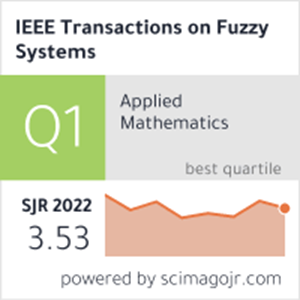MAFRO: Optimal-Granularity Fuzzy Decision Rule-Based Classification Architecture for Attribute Unlearning
IF 11.9
1区 计算机科学
Q1 COMPUTER SCIENCE, ARTIFICIAL INTELLIGENCE
引用次数: 0
Abstract
Recently, many laws and regulations have granted users the right to be forgotten, i.e., the right to require data controllers to delete user data. Various methods for machine unlearning have been proposed to remove individual data points. However, they do not scale to the scenarios where larger groups of features are to be removed. To address this challenge, we propose MAFRO, an optimal-granularity fuzzy decision rule–based classifier that accelerates unlearning via influence functions. Building on granular computing (GrC), MAFRO first selects a minimal reduct of attributes, then constructs fuzzy granules with a Gaussian membership function to extract concise decision rules and realizes unlearning through the influence function. Specifically, instead of training with the full set of attributes, we use the reduct, a minimal subset of attributes that can classify the data with the same accuracy as the full set of attributes. Next, we extract fuzzy rules based on the reduct. Finally, fusing the generated rules establishes the linear model with strongly convex loss functions. In this way, MAFRO can quantify the divergence caused by attribute deleting and update the model without retraining it, thereby adapting the influence of data removal on the model and accelerating the unlearning process. We conduct extensive experiments to evaluate MAFRO on 10 typical datasets in terms of performance and unlearning speed. We compare MAFRO with the state-of-the-art algorithms. Experimental results demonstrate that MAFRO enhances accuracy by an average of 6.96%, and achieves up to 236× speedup for attribute unlearning tasks.基于最优粒度模糊决策规则的属性去除分类体系结构
最近,许多法律法规都赋予了用户被遗忘的权利,即要求数据控制者删除用户数据的权利。已经提出了各种机器学习方法来去除单个数据点。然而,它们不能扩展到要删除更大组特性的场景。为了解决这一挑战,我们提出了MAFRO,一种基于最优粒度模糊决策规则的分类器,通过影响函数加速学习。MAFRO在颗粒计算(GrC)的基础上,首先选择属性的最小约简,然后用高斯隶属函数构造模糊颗粒,提取简洁的决策规则,并通过影响函数实现遗忘。具体来说,我们不是使用完整的属性集进行训练,而是使用约简,这是一个最小的属性子集,可以以与完整的属性集相同的精度对数据进行分类。接下来,我们在约简的基础上提取模糊规则。最后,对生成的规则进行融合,建立具有强凸损失函数的线性模型。这样,MAFRO可以量化属性删除造成的偏差,无需重新训练就可以更新模型,从而适应数据删除对模型的影响,加速学习过程。我们在10个典型的数据集上进行了大量的实验来评估MAFRO的性能和学习速度。我们将MAFRO与最先进的算法进行比较。实验结果表明,该方法平均提高了6.96%的准确率,对属性学习任务的加速高达236倍。
本文章由计算机程序翻译,如有差异,请以英文原文为准。
求助全文
约1分钟内获得全文
求助全文
来源期刊

IEEE Transactions on Fuzzy Systems
工程技术-工程:电子与电气
CiteScore
20.50
自引率
13.40%
发文量
517
审稿时长
3.0 months
期刊介绍:
The IEEE Transactions on Fuzzy Systems is a scholarly journal that focuses on the theory, design, and application of fuzzy systems. It aims to publish high-quality technical papers that contribute significant technical knowledge and exploratory developments in the field of fuzzy systems. The journal particularly emphasizes engineering systems and scientific applications. In addition to research articles, the Transactions also includes a letters section featuring current information, comments, and rebuttals related to published papers.
 求助内容:
求助内容: 应助结果提醒方式:
应助结果提醒方式:


